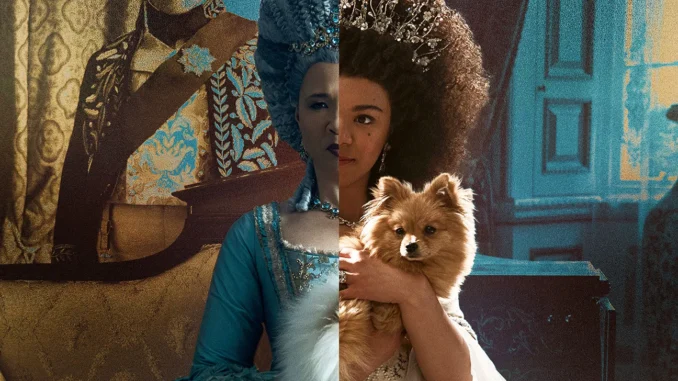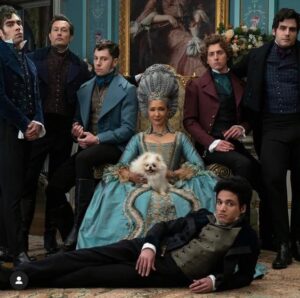
This season is full of female-driven shows boasting performers playing young and older versions of the same complex characters.
I knew I’d been sucked into Netflix‘s Queen Charlotte when 21-year-old star India Amarteifio offered her first onscreen sneer. Playing the young version of Bridgerton’s capricious royal (Golda Rosheuvel) in this prequel series, the actress showcases plenty of theatrical rebellion by smashing busts and monologuing about all the ways her corsetry could kill her. She’s cutting and caustic in her small, safe German principality. But once she arrives a powerless pawn at the English court, she must suddenly play-act the role of submissive consort.
Yet, as her future mother-in-law (Michelle Fairley) encircles her in a palace apartment, Charlotte can barely tolerate this vile inspection of her body parts. “You have good hips,” Augusta proclaims, pulling on Charlotte’s bodice. “You will make lots of babies. As many babies as possible for my son.” Amarteifio stares, blinks, smiles curtly and responds with cold dismissiveness. Rosheuvel’s Queen Charlotte is a lovable bitch; Amarteifio’s is a lovable, vulnerable bitch.
It’s not always easy to match younger and older versions of the same character played by different actors: Even small differences in looks, delivery and cadence can lead to significant cognitive dissonance. Shows that utilize parallel timelines often feel like two different series trapped side by side. The shows that do expertly employ this storytelling device, however, aren’t just feats of writing and editing, but acting as well. Successful performers in these roles don’t merely imitate one other; instead, they cultivate each other in a feedback loop, the character pairs serving as acting partners even if they never share a scene together. And while it’s sometimes easier for awards voters to see merit in the work of a familiar face in an industry veteran, they should also consider the tremendous efforts of up-and-coming players who stand out in their own right.

Queen Charlotte, which follows our heroine at the start of her uneasy marriage and then several decades later as the longtime queen navigates a succession crisis, takes a risk in weaving these timelines so tightly. If Rosheuvel and Amarteifio were too in sync, then you might wonder why the protagonist hadn’t matured in 40-plus years. If too disparate, you’d wonder why you were watching Charlotte’s origin story at all. Rosheuvel’s Charlotte is a smirking virago who takes pleasure in playing the nobility like dolls. Amarteifio’s version is more insecure and uncertain but no less acid-tongued. Her charisma carries through her rapid-fire line readings, the young protagonist’s means of exhibiting intellect and dominance. In turn, Rosheuvel does more with gestures and expressions, her Charlotte’s haughtiness having been fermented through years of monarchical hardships.
Similarly, Starz’s The Serpent Queen tracks the rise of a humble young woman whose royal marriage catapults her into a viper’s den. Like Charlotte, Catherine de’ Medici (Liv Hill and Samantha Morton) is plucked from near obscurity, transported to a new land and then wed to a weirdo princeling. She is soon transformed from a mouthy Florentine convent waif to a mouthy French princess, but her Machiavellian qualities eventually allow her to grab power in her own right. Hill is endearingly magnetic as teenage Catherine, a scrappy kid who learned early that, unlike the other women of the court, she won’t be able to rely on beauty or sexuality to get what she wants — and cunning has more longevity than physicality does . Hill’s Catherine is a brash vulgarian with street smarts, whereas Morton’s has been tempered through years of heartache. Hill is a comic delight, especially when she’s visibly beaten down by the grotesque regalia of her station, but Morton drips venom in every line delivery.
Tragedy bonds the characters of Showtime’s Yellowjackets, a group of middle-aged women who survived a plane crash when they were teenagers in the 1990s. The magic of the show isn’t just in its exploration of madness and superstition, but how it threads its parallel timelines through its actors’ talents. Melanie Lynskey, Juliette Lewis, Christina Ricci and Tawny Cypress were casting coups from the start of production, but the true shock of the ensemble is how well their younger counterparts complete their older selves. Young actors Sophie Nélisse, Sophie Thatcher, Samantha Hanratty and Jasmin Savoy Brown, respectively, carry the drama as masterfully as the actors in the present day.